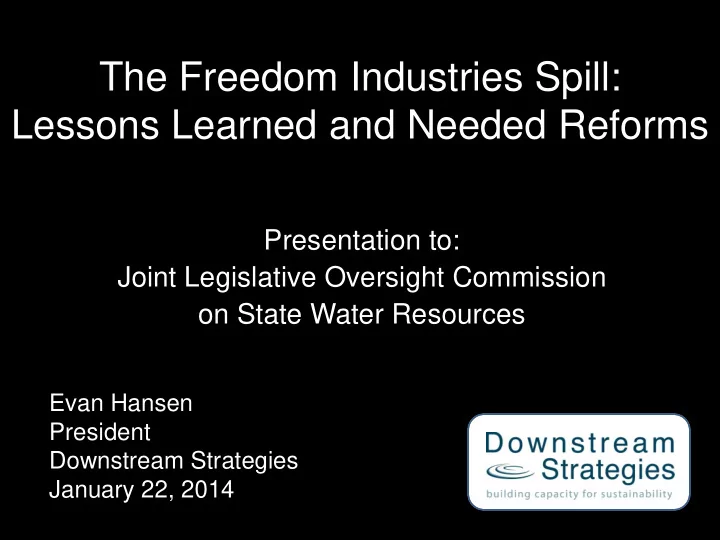

The Freedom Industries Spill: Lessons Learned and Needed Reforms Presentation to: Joint Legislative Oversight Commission on State Water Resources Evan Hansen President Downstream Strategies January 22, 2014
Downstream Strategies Environmental consultants Started in 1997 Staff of 11 Offices in Morgantown and Alderson
Downstream Strategies offers environmental consulting services that combine sound interdisciplinary skills with a core belief in the importance of protecting the environment and linking economic development with natural resource stewardship.
Clients Federal (VA, USFWS, ARC) State (DEP, Conservation Agency) Local (Pocahontas Co., Jefferson Co.) Foundations and nonprofits Universities (WVU, Kent State) Attorneys Individuals Private businesses
West Virginia Rivers Coalition A statewide nonprofit organization focused on protecting West Virginia’s water resources and upholding people’s right to use and enjoy clean water.
It’s time to change the tone Elected officials, agency heads, and members of the Legislature Anti-regulation, anti-EPA rhetoric Protecting human health and the environment is directly linked to a thriving, diversified economy
Failures at multiple levels Government Federal State Local Private industry Freedom Industries West Virginia American Water
Zone of Critical Concern, Charleston Drinking water intake Freedom Industries
Zone of Critical Concern, Morgantown Drinking water intake Industrial Park: Chemtura, Marcellus wells
Zone of Critical Concern, Huntington Industrial sources are blue circles Drinking water intake
Potential significant contaminant sources within ZCCs Industrial Other Total Charleston 7 44 51 Morgantown 34 21 55 Huntington 206 218 424 Other sources: residential, commercial, municipal, agriculture
Our report focus on three key laws 1. Clean Water Act 2. Safe Drinking Water Act 3. Emergency Planning and Community Right-to-Know Act Other CERCLA Toxic Substances Control Act Oil Pollution Act Chemical Safety Board recommendations
Clean Water Act Freedom Industries holds NPDES permit Registration under the state’s general multi-sector industrial stormwater permit DEP issues and enforces these permits Includes many items related to spills Requires immediate reporting of noncompliance that may endanger health or the environment
CWA recommendations Require that DEP inspect all NPDES- permitted sites, and immediately inspect the most critical sites Prohibit coverage under the general industrial stormwater permit for facilities in zones of critical concern Require additional permit conditions for facilities such as the Freedom Industries site Increase funding and staffing for DEP’s NPDES and environmental enforcement programs
Safe Drinking Water Act Source Water Assessment Report written in 2002 The system is highly susceptible to contamination Delineates a zone of critical concern ~50 potential significant contaminant sources are in this zone, including Freedom Industries No Protection Plan appears to have been written
SDWA recommendations Update Charleston’s SWAR, and all SWARs across the state Mandate Protection Plans and provide for funding to write them Provide for state-specific protective standards for chemicals used in large quantities in West Virginia Local emergency planning committees should carefully review SWARs and take all necessary actions
Protection Plans in Ohio Ohio EPA lists 5 example Protection Plans Upper Ohio River Protection Plan Initiated by OEPA Included 6 communities between Follansbee, WV and East Liverpool, OH Held 6 meetings Weirton, Follansbee, Arcelor-Mittal Steel Plating, and WVDHHR invited to participate
Emergency Planning and Community Right-to-Know Act Requires hazardous chemical emergency planning Requires industry to report on the storage of hazardous chemicals Freedom Industries filed Tier Two Emergency and Hazardous Chemical Industry forms Specifically listed MCHM along with 16 other chemicals since 2007 List MCHM as “immediate (acute) physical and health hazard” Quantity of MCHM stored onsite: 100,000- 999,999 pounds
Chemical 2007 2008 2009 2010 2011 2012 Ammonium lignosulfonate Calcium chloride Calcium chloride solution FFC-10 Glycerin Crude glycerin, recovered Glycerin rework Fatty acids, recovered Magnafloc 156 Magnafloc 368 Magnafloc 455 Magnasol CN2 MCHM PDO concentrate RDC-777 Soda ash Zetag 7645
EPCRA recommendations Support local emergency planning committees and local governments in their planning efforts Local emergency planning committees should utilize the information submitted on Tier Two forms to minimize risk
Local emergency planning committees Division of Homeland Security and Emergency Management maintains list One for each county except: Cabell/Wayne Kanawha/Putnam Lewis/Upshur Marshall/Wetzel Wood/Wirt
Proposals on the table Senate Bill 373 Governor’s recommendations Our recommendations
Senate Bill 373 Focuses on ASTs Does not recognize authorities under existing NPDES permit Does not mandate Protection Plans
Governor’s recommendations Does not recognize value of clean water to economic prosperity, human health Focuses on ASTs (with numerous loopholes) Does not recognize authorities under existing NPDES permit Requires Protection Plans within 90 days, but does not provide funding
Our recommendations Take advantage of existing NPDES authorities: Require INDIVIDUAL permits for industrial facilities in ZCCs Require DEP inspections Require additional permit conditions Increase funding and staffing at DEP
Our recommendations Support the rapid development of sound Protection Plans Mandate them, but recognize that planning process takes time to develop community support Provide funding
Our recommendations Provide for state-specific protective standards for chemicals used in large quantities in West Virginia
Evan Hansen President Downstream Strategies Morgantown, WV (304) 292-2450 ehansen@downstreamstrategies.com
Recommend
More recommend